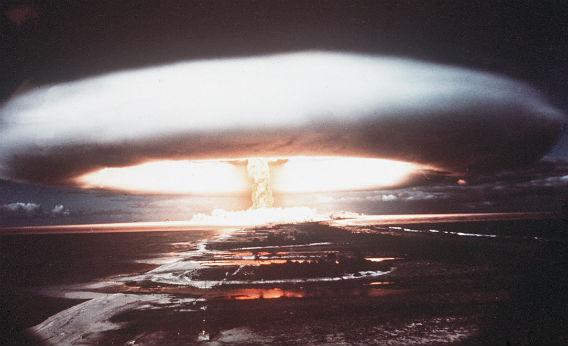Yesterday, word leaked out that North Korea, the world’s most closed society, is getting ready to perform its third nuclear weapon test, following earlier tests in 2006 and 2009. If true, it would come on the heels of a recent failed rocket test (supposedly a step toward the development of an intercontinental ballistic missile capable of reaching the United States) and saber-rattling threatening to reduce the South Korean government to “ashes.”
In response, White House spokesman Jay Carney warned North Korea against “engaging in any more hostile or provocative actions.” As we watch to see what North Korea does next, this is an opportune time for the United States to reassess its own policies on nuclear tests—not only because of the political landscape, but also because of changes in science.
One of the simplest first steps toward escaping the nuclear menace that has haunted us for more than 65 years would be to encourage a worldwide ban on the testing of nuclear weapons. It is hard to see a downside to such a move, as it would also help constrain the ability of current non-nuclear states to develop nuclear weapons. Nevertheless, the U.S. Congress, in its infinite wisdom, has managed to block implementation of an international Comprehensive Nuclear-Test-Ban Treaty for the past 15 years.
The obligations of the treaty, ratified by 157 countries, are clear:
- Each State Party undertakes not to carry out any nuclear weapon test explosion or any other nuclear explosion, and to prohibit and prevent any such nuclear explosion at any place under its jurisdiction or control.
- Each State Party undertakes, furthermore, to refrain from causing, encouraging, or in any way participating in the carrying out of any nuclear weapon test explosion or any other nuclear explosion.
But despite the fact that Bill Clinton was the first of 72 leaders to sign the proposed CTBT on Sept. 24, 1996, at the United Nations, and even though the United States has itself not carried out a nuclear weapons test since Sept. 23, 1992, Congress has consistently refused to ratify the agreement. The primary objections are that the treaty could damage the safety and viability of our existing arsenal; make it difficult to detect tests or explosions carried out by other countries; and threaten the United States supremacy in nuclear technology if other countries engage in covert testing to develop new technologies.
But much has changed since Congress last explicitly voted down the CTBT in 1999. On March 30, the National Academy of Science presented a landmark report, based on a comprehensive study by the National Research Council and carried out at the request of the Office of the Vice President and the White House Office of Science and Technology. The authors examined all technical objections raised to the CTBT, and their conclusions are unambiguous. As stated in the Executive Summary:
Provided that sufficient resources and a national commitment to stockpile stewardship are in place, the committee judges that the United States has the technical capabilities to maintain a safe, secure, and reliable stockpile of nuclear weapons into the foreseeable future without nuclear-explosion testing. … As long as the United States sustains its technical competency, and actively engages its nuclear scientists and other expert analysts in monitoring, assessing, and projecting possible adversarial activities, it will retain effective protection against technical surprises. This conclusion holds whether or not the United States accepts the formal constraints of the CTBT.
While the conclusions of the NAS report do not come as a great surprise to many technical experts who have long advocated for the CTBT, this is the first time a high-level, nonpartisan technical group has made such a comprehensive, conclusive analysis.
Of course, it would be naive to assume that Congress has failed to ratify the CTBT only because of legitimate technical concerns. In all such issues of national security, politics plays a dominant role—and Republican politicians in particular are loath to appear either soft on defense or willing to take orders from other countries. Nevertheless, now that the apparent technical obligations against ratifying the CTBT have been all but removed, we can begin to re-energize the political campaign for U.S. ratification.
Early in his presidency, Obama voiced support for a test ban, saying in a 2009 address, “the United States has a moral responsibility to act. We cannot succeed in this endeavor alone, but we can lead it, we can start it.”
He is right: The United States needs to lead here. If we do not forgo the right to test our own vast arsenal, it is hypocritical to vilify North Korea for testing nuclear weapons or Iran for possibly trying to manufacture them. Of course, ratifying the CTBT would not guarantee that North Korea or Iran would respond appropriately. They probably won’t—at least not right away. But, other than Pakistan, India, China, Israel, and North Korea, the United States is the only nuclear weapons state that has not ratified the treaty.* Ratification by the United States, though not exactly snatching the current moral high ground, would at least help establish some additional credibility in working with the rest of the international community to stem activities by future rogue states. By continuing to hold out, the United States isn’t making itself, or the rest of the world, any safer.
This article arises from Future Tense, a collaboration among Arizona State University, the New America Foundation, and Slate. Future Tense explores the ways emerging technologies affect society, policy, and culture. To read more, visit the Future Tense blog and the Future Tense home page. You can also follow us on Twitter.
*Correction, April 25, 2012:This article originally failed to include China, India, and North Korea in the list of nuclear weapons states that have not ratified the Comprehensive Test Ban Treaty. (Return to the corrected sentence.)
